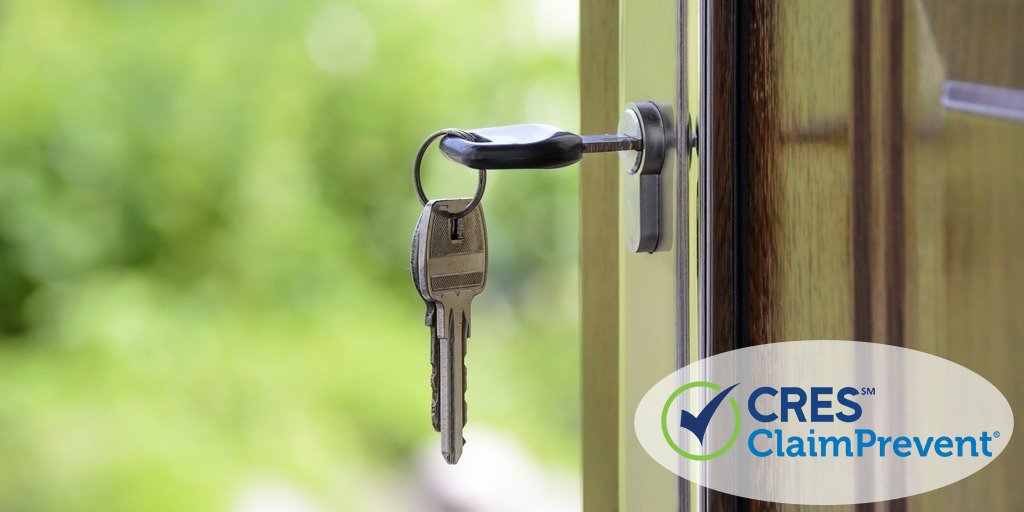Real estate is a busy profession and you can’t be everywhere at once. Sometimes it might be tempting to consider unescorted access to prospective tenants and buyers. But, should you consider allowing a home showing without you being there? Is it just too risky?
What Can Go Wrong?
In truth, there are many risks associated with allowing unescorted access to properties for prospective tenants and buyers — even when you have written permission from the homeowner to do so. Be aware of the risks before you find yourself facing a lawsuit, damage to your reputation, and potential financial ruin.
Damage to Property
Damage to a property can occur during any home showing. However, if you’re not there to accompany a prospect, there’s an increased risk that something can go wrong. What if a seller claims that there has been property damage arising from the unescorted inspection?
It’s a difficult position for both the prospect and for you as a real estate professional. It will be difficult to prove the damage did not occur during the unescorted inspection without witnesses.
Injury
There is also a risk of injuries with unescorted inspections. What if a prospect trips over a hazard while viewing the property? An unexpected sunken living room or step down, uneven pavers or tiles, a slippery throw rug these issues do happen.
The Valley Business Journal reported a case where an injured party sued a seller, seller’s broker, the seller’s real estate agent, the buyer’s broker and the buyer’s real estate agent for not taking steps to tell her about a step to a sunken living room. The injured party was touring the property with her daughter, who was purchasing the home. They were not escorted by a real estate agent, and the mother broke her hip as a result of a fall. The property was already under contract at the time of the injury, and the buyer’s broker and real estate agent, in this case, were found to have no legal liability. But, agents need to be aware that scenarios just like this happen frequently in real estate.
Theft
An obvious concern associated with unescorted access is the potential theft of items in the home. The stakes are higher with properties full of personal belongings — properties that are lived in by the seller or current tenants.
Vacant properties are a less risky endeavor for unescorted access, but not without risks altogether. Even without personal belongings, there is still potential for fixtures and other household items to be stolen.
Unauthorized Access Using the Lockbox Code Provided After the Fact
Lockboxes allow easy access to properties and avoid the need to pick up and drop off keys across town. But sharing the lockbox code with prospects to inspect a property unescorted is a risky practice. What if that prospect shares the lockbox code? Or uses the code after the fact for criminal means? Where does that leave a real estate agent? Potentially facing a lawsuit from the seller if something goes wrong.
Risk Mitigation Strategies If You Must Do An Unescorted Home Inspection
Escorted access to properties for sale or rent is always preferable. If you can’t avoid an unescorted inspection, follow these tips to protect yourself and your business:
- Ensure the seller or tenant has signed off on the unescorted access — without their permission, it simply cannot happen.
- If providing access to a lockbox, don’t ever use generic codes. Ensure it’s an individual code that enables you to identify who accessed the property and when. Retire the code after the inspection has been completed, so that the client cannot access the property in the future unless authorized.
- Ensure the property is free from hazards which could cause personal injury. Ideally, check out the home prior to the inspection — even if it’s 1-2 days prior. Never send prospects unescorted to a property you are not familiar with.
- Pre-screen prospects and ensure you have their name, contact details, and ID on file.
- If the property is lived in, advise the sellers not to leave valuables visible in the home (or remove them entirely) — e.g., jewelry, cash or other valuable personal belongings.
What Does Your Insurance Cover?
Keep in mind you may not be insured if you allow unescorted access to properties. Speak to an insurer like CRES to see what level of coverage you would have (if any).
CRES E&O + ClaimPrevent® offers a premium level of real estate errors and omissions insurance for real estate professionals. This can include coverage for open houses and showings, which means protection if a visitor gets injured or property is damaged during an open house, showing, or other selling activity. You won’t find this with many other E&O policies.
To find out more about how you can get the insurance you need for your real estate business, contact the CRES customer service team at 800-880-2747 for a confidential discussion.
